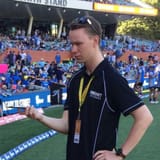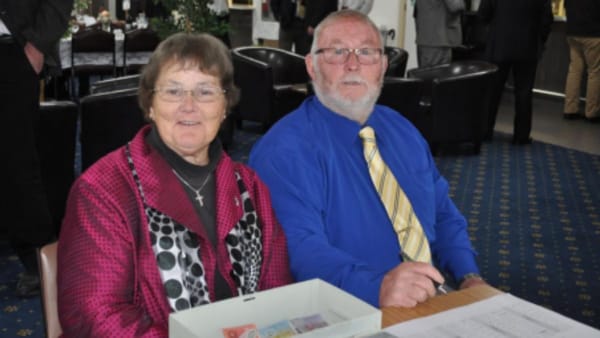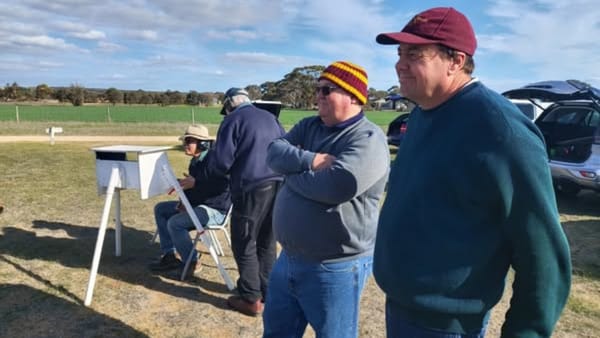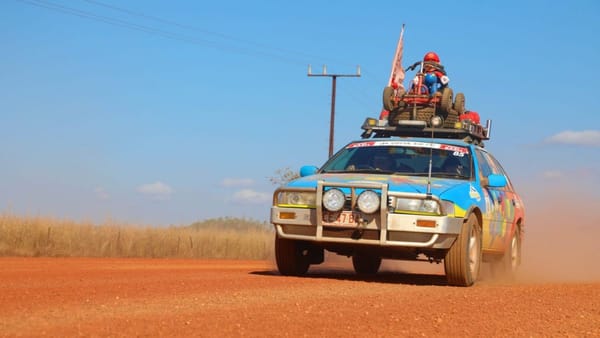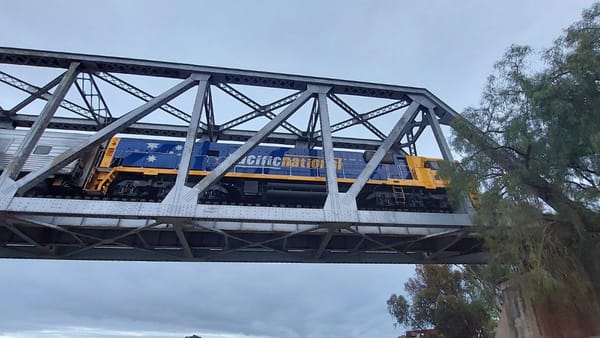Morgan Coull pushes his Aussie spirit to the extreme in Bear Grylls TV show
The local paramedic will feature in an epic new adventure race hosted by the British survival adventurer on Amazon Prime.

This story was originally published behind Murray Bridge News’ paywall. Paywalled stories are unlocked four weeks after publication. Can’t wait that long? Subscribe here.

Morgan Coull is not the sort of person to do things by halves.
At the turn of the millennium he was a national-level 400-metre sprinter hoping to represent his country at a home Olympic games.
But a subarachnoid brain hemorrhage - after which he spent a month in intensive care - forced him to, as he put it, “slow things down a little bit”.
That “slowing down” meant trading in the sprinting for something a little more extreme: adventure racing.
For those of you asking, it’s essentially this: a group race with a variety of different disciplines in difficult terrains.
There is usually mountain biking and navigating, but there can also be abseiling, white water rafting and even skiing.
Big events - like the Eco-Challenge Fiji that Mr Coull recently competed in - often go for days on end.
In fact, he and his Aussie Rescue teammates competed against 65 other teams over 11 days for the new show, which will premiere on Amazon Prime on August 14.
Watch the trailer for the series below.
The team
Team Aussie Rescue captain Sam Gash, a well known ultra runner, asked Mr Coull to join her team.
“She said ‘Eco-Challenge is coming back, Bear Grylls is hosting it, are you keen?’ and I said yes I am,” Mr Coull said.
Joining him were Sam’s husband Mark Wales and ace navigator Jarrod Mitchell.
“Mark’s an ex-SAS elite solider, so he’s a tactician, breaking it down into manageable chunks,” Mr Coull said.
“I’m the paramedic doing the team doctor-type role.”
Ms Gash had the difficult job of ensuring the team stayed on track while off the beaten track.
“She’s a great organiser and always thinking in the background about what’s coming up next and making sure we’re ready,” Mr Coull said.
It takes something truly special to compete in endless difficult terrain like steep, thick jungle where, even at full effort, you might only move one kilometre an hour.
Trust with your teammates then is absolutely paramount.
“You really want to go into these things with a team that you’ve got a bit of faith in and have common goals or what you want to get out of it,” he said.
“I’ve seen it many times where teams just implode, fall apart and give up mid-race or never talk to each other again.”
The mixed-gender teams are also supported at different checkpoints by a team assistant crew member, who has a camp and essential supplies ready.
Overall, though, despite the extreme dangers and challenges facing them, Mr Coull said it was keeping a positive outlook that made you a real winner.
“The goal is to have fun, smile, don’t sweat the big things and come out of it as friends,” he said.
“Results at the end of the day are second to making sure you’re there for the right reasons.”
The race
Covering 671 kilometres in 11 days without a vehicle is tricky enough.
Add in navigating yourself through sliding mud, white water and thick jungle as a start and you truly have something extreme on your hands.
“You know they’re going to throw a few curveballs at you, so you’re always thinking that while it’s going okay, now any moment things could change,” Mr Coull said.
“If you’re not prepared, if you don’t have the right gear or enough food or water, you can come unstuck pretty quickly.”
The other 65 teams from 30 countries do not present the biggest challenge.
It’s your own team against the clock.
“You’re always chasing the clock, so if you don’t make specific cutoffs, you’re out,” he said.
“If you mess up your navigation or something goes wrong, that clock starts chasing your tail.”
As shown in the trailer, participants often ran on as little as four hours sleep in four days, which dramatically increased the danger of the race.
'“Lack of sleep is definitely the biggest challenge,” Mr Coull said.
“With lack of sleep comes poor decision making, and that can even be placement of feet when climbing or navigating a river.”
The sheer relentlessness of continuous competition also means your body naturally wears down physically.
“Because it goes on day after day you have a problem with regulating body temperature,” he said.
“If you get wet and cold and you don’t do anything about that, it can put you into hypothermia and that can be a game-changer.”
Without giving too much away, Morgan did hint that simply finishing the challenge would be as good as being the first to cross the finish line.
On a similar course in the early 2000s, only one in six of the teams that started managed to finish.
The experience
Not counting the lead-up training that team Aussie Rescue undertook in Australia, the race took Mr Coull away for four weeks last September.
“There’s a bit of lead-up to it where you have to mark off your competency checks like white-water rescue,” he said.
Not only were there 330 competitors, but also a crew of over 900 to make sure every minute of footage was captured.
“It’s one of the biggest production crews every assembled for this show and what they’re going to put together is going to be pretty amazing.”
Asked whether he was looking forward to watching himself pushed to the absolute limit on camera, he had to chuckle about what state competitors could end up in while racing.
“There’s no showers, there’s very little sleep - it’s not pretty,” he said.
One compensation for competitors was getting to experience the wilderness of Fiji first hand.
“Fiji is such an amazing place,” he said.
“We went to places that were well off the beaten path that people usually don’t get to see, going to remote villages where they don’t see too many westerners or tourists and seeing how happy and welcoming they are.
“They’re on the very basics out there but they’re the happiest people in the world because life’s simple.”
Plus, of course, there was meeting the host himself, renowned adventurer Bear Grylls, who Mr Coull said was exactly like on TV: “such a down-to-earth guy and so humble … always really approachable and giving of his time”.
Bringing the adventure to the Murraylands
Now Mr Coull is back home in Murray Bridge with his wife and two boys, but his foot has not come off the pedal.
There’s his work as a paramedic, coaching local sport, and acting as chairman for Murraylands Multisports Inc, which he helped found.
The group has and continues to organise events from casual fun runs to adventure races around the Murraylands, encouraging people of all ages to get involved.
It all began because of Mr Coull’s family.
“When Murraylands Multisports started it organised a fun run to raise awareness of juvenile diabetes,” he said.
“My wife’s a type one diabetic and so is my brother-in-law.
“Murray Bridge has a very high rate of obesity, and as a paramedic I see the implications of that daily.”
When there’s been a challenge, Morgan has risen to it.
In tackling childhood obesity, MMI eastablished the Kids Run Wild initiative to get more young people off their screens and moving.
When Covid-19 hit, online running groups were established to support people to keep getting out of the house and being active.
He also helped with securing a $200,000 grant last year from the Office for Recreation, Sport and Racing to develop a world-class trail at Cypress Hill, which he said went towards promoting Murray Bridge as an adventure capital of South Australia.
“We’ve got things like the Federation Trail, the Rockleigh 105 Gravelfest mountain bike challenge in September and the Murray Bridge Marathon Festival in November bringing people into the town,” he said.
“We encourage them to stay and take in the great sights of Murray Bridge and what it has to offer.”
- Register for the Federation Ultra Trail on August 15: Visit www.mmievents.com.au.
Photo of Team Aussie Rescue members Morgan Coull, Samantha Gash, Mark Wales (seated) and Jarrod Mitchell: teamaussierescue Instagram. Videos: Amazon Prime Video/YouTube.

